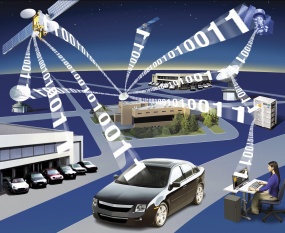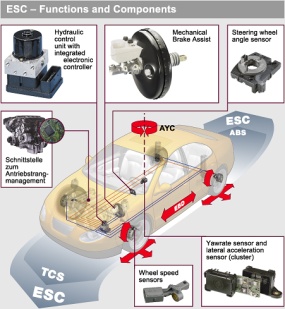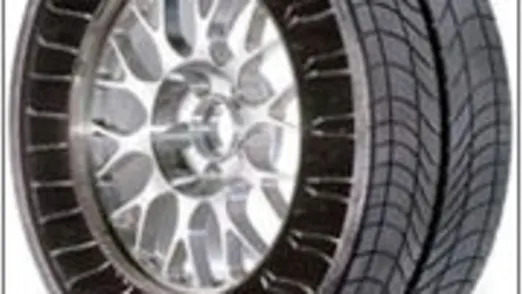Autoblog: Thanks for taking the time to talk to Autoblog. Why don't we start by discussing what Continental is announcing today.
Bill Kozyra: Sure, Continental is pleased to be exhibiting at the Chicago Auto Show for the first time as part of our reaching out to the local community in the Greater Chicago area, showcasing Continental as a new employer in town by virtue of acquiring the Motorola automotive electronics business in Deerpark, Illinois, which is just down the road. We are now a new automotive supplier and have a large presence here in town. So our theme here at the Chicago Auto Show is really demonstrating automotive safety technologies. In essence, those kind of technologies that make the car smarter and safer and at the same time still a lot of fun to drive. We build on our longstanding 101 year technology heritage of innovation and, and we're also showcasing how Continental is a great place to work.
Follow the jump to read more about what Bill Kozyra has to say about their new acquisition, various safety systems, tires and motorsports.
[Source: Autoblog.com]
AB: The Motorola business that you just bought, is that their automotive microprocessor business?
BK: Exactly. It's their automotive electronics business, which would have included telematics, which is wireless communication technology. And, and we are now the sole high-volume producer of telematic devices in automobiles such as the General Motors OnStar, the BMW Assist and the Mercedes telematics devices. We also acquired from Motorola the power- train and chassis control electronics, which is engine controllers and transmission controllers. The third area would be sensors. We're in production and developing sensors for automotive applications. The fourth area would the body electronics, which is all of the door closures, window closures, seat functionality, sunroof, lift gates and so on.
AB: Is this a new area of business for Continental?

AB: On the subject of the active safety systems, I think I know what the answer is going to be. But what's Continental's position on NHTSA's proposal to make stability controls standard equipment on all vehicles?

AB: One of the issues that is only now coming to the forefront is long-term support for owners, as more and more of these vehicles have these complex systems and they've been on the road for 10-15 years. They're generally not the kind of systems that in the past people could have fixed on their own and they're, they're not inexpensive systems to repair. What's, Continental's stance as far as supporting owners long term, making parts available in the aftermarket for repairs or providing some means for people to diagnose what the problems are so that they can get repairs?
BK: First of all, like I said these technologies are all designed and validated to function for the life of the vehicle. That's an approach that we use for all automotive components. However, in the event that these components do need to be serviced we would not be opposed to supporting the servicing of these components with replacement parts. And for example, we have an aftermarket business which goes under the brand name of ATE, with is Alfred Teves, and there we sell replacement parts for brakes and electronics, which is not only brake rotors and brake linings but also includes electronic control units for, for vehicles where there's a need to replace the some of the many ECUs that are on the car today.
AB: So independent service stations are able to get replacement parts rather than the owner having to go back to a dealer after the vehicle is out of warranty?
BK: Yes. These technologies like stability control have, have been out there now for, for ten years. So it's actually been on the cars for more than ten years. We're not seeing a great demand for replacement parts. Granted, the installation rates back then were, were quite low. But as that demand increases we're prepared to support that.
AB: The early installations tended to be on higher end vehicles and the people who would have owned those would be more likely to have them serviced by the dealer, vehicles like Mercedes and BMW and Audi. So it's now becoming more wide spread on more mainstream vehicles, going forward it will be probably be more of an issue for people.
BK: But we should note that stability control have been on vehicles such as the Ford Focus and the Volkswagen Beetle now for probably six, seven years.
AB: On the subject of tires,.Michelin has been quite active in developing and promoting this airless tire technology that they're working on. The Tweel technology it's called. Is Continental doing anything really new or innovative in the way of tires?

AB: Several years back Continental showed a concept with tires that had sensoring systems built into the sidewalls for doing the wheel speed sensing directly off the tire? Has that progressed any further or is that a technology that won't be pursued?
BK: That was our intelligent tire. We had to make that a part of the sidewall of tire that we would place near the wheel speed sensor. We have determined that the accuracy of that technology as these systems get more and more sophisticated was not robust enough to provide the level of accuracy that we need for the safety systems on the cars. So we discontinued the development of that particular approach of adding a level intelligence to the tire, but instead have replaced it with other tire developments such as the pressure sensor, that would allow us to detect the inflation pressure and then also provide additional functionality to the automobile, knowing things such as forces like lateral loads and so forth. Those developments have continued.
AB: The last area I'd like to touch on is motor sports. Continental at least in recent years hasn't had any large scale motor sports involvement unlike your competitors, Goodyear, Michelin and Bridgestone. Do you not see motor sports as being a worthwhile investment?
BK: No. We've, we've clearly stated that that's an area that you typically would not expect to see Continental involved in in the future. Of course, you know, we're into making tires, we're into two wheel vehicle tires, such as bicycle tires and so forth, and then we have passenger vehicle tires, light and heavy duty truck tires. But we would not be expanding or getting into the motor sports areas.
Thanks to Bill Kozyra for taking time to talk to Autoblog.


Sign in to post
Please sign in to leave a comment.
Continue